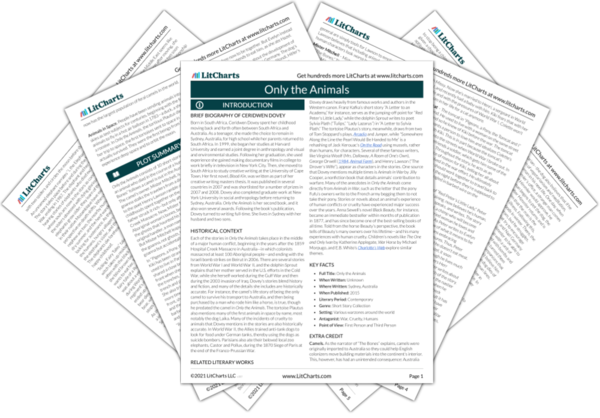The Cat/Kiki-la-Doucette Quotes in Only the Animals
But this late autumn at the front is unlike any I have witnessed. Without the changing palette of the trees to signal the shift towards winter (the leaves have been exploded off), and the songbirds mostly gone quiet, it becomes difficult to know where I am, in what season, in which century.
I looked more closely at the man driving the mules. He was far too old to fight. The mules showed none of their usual inclination to misbehave and were following him peaceably. “They love him,” I said.
“And he them. I’ve seen a driver refuse to leave his team of battery mules when they became entangled in barbed wire. He died with them.”
“Why are so many of them missing their tails?” I asked.
“When they’re starving, they eat each other’s tails.”
“Don’t eat any of it,” I said.
The tomcat looked offended at my suggesting he would take the food. “I have my own adopted soldier. But you should eat what he’s offering even if you’re not hungry. You might be the only thing keeping him alive until he’s rotated out of the front line and can get some rest.”
But there is mechanical trouble while he’s up there and instead of getting sips of water or tablets, he starts getting zapped by the electric pads wired to the soles of his feet. He gets back to earth, gets out of the capsule and the NASA guys are smiling, holding his hands, but Enos is fucking mad. This used to make me laugh. But up in space, I just had to think about this, about Enos getting buzzed on his feet for doing the right thing—the right thing! what he’s been trained to do!—and I wanted to bite somebody’s face off.
Perhaps you should be asking yourselves different questions. Why do you sometimes treat other people as humans and sometimes as animals? And why do you sometimes treat creatures as animals and sometimes as humans?

The Cat/Kiki-la-Doucette Quotes in Only the Animals
But this late autumn at the front is unlike any I have witnessed. Without the changing palette of the trees to signal the shift towards winter (the leaves have been exploded off), and the songbirds mostly gone quiet, it becomes difficult to know where I am, in what season, in which century.
I looked more closely at the man driving the mules. He was far too old to fight. The mules showed none of their usual inclination to misbehave and were following him peaceably. “They love him,” I said.
“And he them. I’ve seen a driver refuse to leave his team of battery mules when they became entangled in barbed wire. He died with them.”
“Why are so many of them missing their tails?” I asked.
“When they’re starving, they eat each other’s tails.”
“Don’t eat any of it,” I said.
The tomcat looked offended at my suggesting he would take the food. “I have my own adopted soldier. But you should eat what he’s offering even if you’re not hungry. You might be the only thing keeping him alive until he’s rotated out of the front line and can get some rest.”
But there is mechanical trouble while he’s up there and instead of getting sips of water or tablets, he starts getting zapped by the electric pads wired to the soles of his feet. He gets back to earth, gets out of the capsule and the NASA guys are smiling, holding his hands, but Enos is fucking mad. This used to make me laugh. But up in space, I just had to think about this, about Enos getting buzzed on his feet for doing the right thing—the right thing! what he’s been trained to do!—and I wanted to bite somebody’s face off.
Perhaps you should be asking yourselves different questions. Why do you sometimes treat other people as humans and sometimes as animals? And why do you sometimes treat creatures as animals and sometimes as humans?











